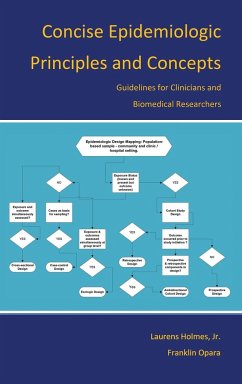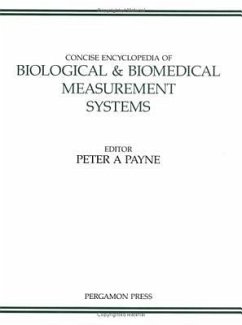
Concise Epidemiologic Principles and Concepts
Guidelines for Clinicians and Biomedical Researchers

PAYBACK Punkte
24 °P sammeln!
This textbook describes the basics of research in medical, clinical, and biomedical settings as well as the concepts and application of epidemiologic designs in research conduct. Design transcends statistical techniques, and no matter how sophisticated a statistical modeling, errors of design/sampling cannot be corrected. The authors of this textbook have presented a complex field in a very simplified and reader-friendly manner with the intent that such presentation will facilitate the understanding of design process and epidemiologic thinking in clinical and biomedical research. Covers these ...
This textbook describes the basics of research in medical, clinical, and biomedical settings as well as the concepts and application of epidemiologic designs in research conduct. Design transcends statistical techniques, and no matter how sophisticated a statistical modeling, errors of design/sampling cannot be corrected. The authors of this textbook have presented a complex field in a very simplified and reader-friendly manner with the intent that such presentation will facilitate the understanding of design process and epidemiologic thinking in clinical and biomedical research. Covers these relevant topics in epidemiology: Case-Cohort Design Prospective Case-Control Quantitative Evidence Synthesis (QES) Instant Cohort Design & Case-Crossover Design Effect Modification & Interaction Epidemiologic Tree - Molecular Epidemiology & Health Disparities Epidemiologic Challenge - "Big Data", mHealth, Social Media 3 "Ts" - Team Science, Transdisciplinary Research, Translational Research Bias, Random error, Confounding Systems Science & Evidence Discovery Research is presented as an exercise around measurement, with measurement error inevitable in its conduct-hence the inherent uncertainties of all findings in clinical and biomedical research. Concise Epidemiologic Principles and Concepts covers research conceptualization, namely research objectives, questions, hypothesis, design, implementation, data collection, analysis, results, and interpretation. While the primary focus of epidemiology is to assess the relationship between exposure (risk or predisposing factor) and outcome (disease or health-related event), causal association is presented in a simplified manner, including the role of quantitative evidence synthesis (meta-analysis) in causal inference. Epidemiology has evolved over the past three decades resulting in several fields being developed. This text presents in brief the perspectives and future of epidemiology in the era of the molecular basis of medicine. With molecular epidemiology, we are better equipped with tools to identify molecular biologic indicators of risk as well as biologic alterations in the early stages of disease.














